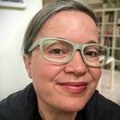The circle of life: The Digital Skills GitBook project
Panorama Rooms | Tue 21 Jan 4:40 p.m.–5:25 p.m.
Presented by
-

Dr Sara King is the Training and Engagement Lead for AARNet. She is focused on outreach within the research sector, developing communities of interest around training and skills development in eResearch. She is passionate about helping others develop the infrastructure and digital literacies required for working in a data-driven world, translating technology so it is accessible to everyone.

Dr Sara King is the Training and Engagement Lead for AARNet. She is focused on outreach within the research sector, developing communities of interest around training and skills development in eResearch. She is passionate about helping others develop the infrastructure and digital literacies required for working in a data-driven world, translating technology so it is accessible to everyone.
Abstract
The Digital Skills GitBook project began in 2021 as part of the broader Council of Australian University Librarians (CAUL) Digital Dexterity Champions Community of Practice (DigiDex CoP) The goal was for a working group of university library professionals to develop a community-driven book on digital and information literacies for the broader academic community. The process of creating the book would be used as professional development for the group as they developed skills such as using Git, GitHub and GitBook, editing with Markdown, creating an open source, crowd-sourced educational resource and community engagement. The project was inspired by The Turing Way and The Carpentries as valuable open source research sector communities.
The first two years of the Digital Skills GitBook project were energetic and garnered much enthusiasm as the core working group of the project (13 members) worked through the founding documentation such as copyright and code of conduct policies, the chapter outline, internal processes for contributing to the resource and presenting the concept far and wide. It was greeted with enthusiasm from library colleagues and contributions began to populate the chapters of the book, peaking at 19 contributors. Things were ticking along and looking really good. The team was having a lot of fun, learning new skills and really believed that the book filled a gap that was desperately needed by the community.
However, the circle of life (or any product or project) is such that there is an eventual decline. Core members of the team changed jobs or priorities and left the project. New members of the DigiDex CoP were less inclined to join the working groups. The content did not capture the potential audience as intended and the small remaining group struggled to maintain energy, despite many attempts keep promoting the work and the group, inviting new members and trying different ways to engage the community.
By 2024 the project had achieved some notable goals: it introduced an unconventional audience to GitHub, set up an international cross-institutional network of librarians to collaborate on an open-source project, and created the structural starting point for an online collaborative book, and published some excellent, pertinent content on digital skills.
This paper will explore the circle of life of community-led projects and examine why some grow, expand and gain a large community following and question why some, like this project, struggle to truly fulfil their potential. Will the cycle of nature breathe new life into this project? Or is it time to leave it to rest and make room for something new?
The Digital Skills GitBook project began in 2021 as part of the broader Council of Australian University Librarians (CAUL) Digital Dexterity Champions Community of Practice (DigiDex CoP) The goal was for a working group of university library professionals to develop a community-driven book on digital and information literacies for the broader academic community. The process of creating the book would be used as professional development for the group as they developed skills such as using Git, GitHub and GitBook, editing with Markdown, creating an open source, crowd-sourced educational resource and community engagement. The project was inspired by The Turing Way and The Carpentries as valuable open source research sector communities.
The first two years of the Digital Skills GitBook project were energetic and garnered much enthusiasm as the core working group of the project (13 members) worked through the founding documentation such as copyright and code of conduct policies, the chapter outline, internal processes for contributing to the resource and presenting the concept far and wide. It was greeted with enthusiasm from library colleagues and contributions began to populate the chapters of the book, peaking at 19 contributors. Things were ticking along and looking really good. The team was having a lot of fun, learning new skills and really believed that the book filled a gap that was desperately needed by the community.
However, the circle of life (or any product or project) is such that there is an eventual decline. Core members of the team changed jobs or priorities and left the project. New members of the DigiDex CoP were less inclined to join the working groups. The content did not capture the potential audience as intended and the small remaining group struggled to maintain energy, despite many attempts keep promoting the work and the group, inviting new members and trying different ways to engage the community.
By 2024 the project had achieved some notable goals: it introduced an unconventional audience to GitHub, set up an international cross-institutional network of librarians to collaborate on an open-source project, and created the structural starting point for an online collaborative book, and published some excellent, pertinent content on digital skills.
This paper will explore the circle of life of community-led projects and examine why some grow, expand and gain a large community following and question why some, like this project, struggle to truly fulfil their potential. Will the cycle of nature breathe new life into this project? Or is it time to leave it to rest and make room for something new?